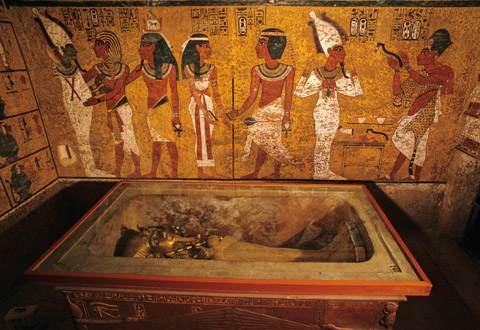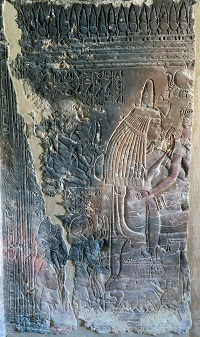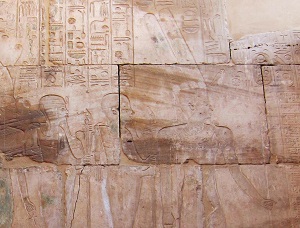Tutankhamun Series
Episodes 1-4
- July 7, 2020 4 Episodes
Episodes 1-4
If you enjoy the ARCE Podcast, consider supporting its production by making a donation.
In This Episode

Professor Aidan Dodson discusses what Egyptologists knew about King Tutankhamun prior to his tomb discovery, and sheds light on the parental lineage of King Tutankhamun, Amarna family portraits and the complicated DNA studies done on the mummy of the king. Professor Dodson also sheds light on the objects that were discovered in the tomb of King Tutankhamun, including those that were actually intended for someone else!
In conversation with Dr. Fatma Ismail, ARCE’s US Director for Outreach and Programs
About Aidan Dodson
Professor Aidan Dodson studied at Durham, Liverpool and Cambridge Universities, being awarded his PhD in 1995. He has taught at the University of Bristol since 1996, and has been Hon Professor of Egyptology in the Department of Anthropology & Archaeology since August 2018. He was Simpson Professor of Egyptology at the American University in Cairo for the spring semester of 2013, and served as Chair of Trustees of the Egypt Exploration Society from 2011 to 2016. Elected a Fellow of the Society of Antiquaries of London, the oldest archaeological body in the UK, in 2003, Professor Dodson is the author of some 25 books and 300 articles and reviews.
If you enjoy the ARCE Podcast, consider supporting its production by making a donation.
In This Episode

Professor Salima Ikram talks about the numerous treasures found in the tomb of King Tutankhamun, his mummy and what’s unique about it, as well as the tomb decorations and the possibility of additional hidden chambers.
In conversation with Dr. Fatma Ismail, ARCE’s US Director for Outreach and Programs
About Salima Ikram
She is Distinguished Professor of Egyptology at the American University in Cairo, Extraordinary Professor at Stellenbosch University, and is a Research Fellow at the Smithsonian’s Natural History Museum. She has worked as an archaeologist in Egypt since 1986. She has co-directed the Predynastic Gallery project and the North Kharga Oasis Survey, and has directed the Animal Mummy Project, the North Kharga Oasis Darb Ain Amur Survey, and the Amenmesse Mission of KV10 and KV63 in the Valley of the Kings. She has worked in Egypt, Sudan, and Turkey as an archaeozoologist. A member of the American Academy of Arts and Sciences, Dr. Ikram has published extensively in both scholarly and popular venues (for adults and children) on diverse subject matters, ranging from traditional Egyptological subjects to zooarchaeological topics. Currently her research focuses on the changing climate of Egypt as reflected in the fauna, relying on evidence derived from pictorial, textual, archaezoological, and climatalogical evidence; changing food sources and eating habits; rock art; and funerary customs.
If you enjoy the ARCE Podcast, consider supporting its production by making a donation.

In this episode:
Professor Kawai discusses the political situation during the reign of King Tutankhamun and highlights the most important women and men in his court. He also details the vast building program of the King and what could be his motives behind it.
In conversation with Dr. Fatma Ismail, ARCE’s US Director for Outreach and Programs
About Nozomu Kawai:
Professor Nozomu Kawai studied at Waseda and John Hopkins Universities, being awarded his Ph.D. on the reign of Tutankhamun in 2006. He has taught at Waseda University and has been a professor of Egyptology at Kanazawa University, Japan, since 2019. He was Simpson Professor of Egyptology at the American University in Cairo for the spring semester of 2015. He specializes in history, art, and archaeology of the New Kingdom Egypt, with a particular emphasis on the period from the late Eighteenth Dynasty to the Nineteenth Dynasty. He has been directing Japanese archaeological excavation at North Saqqara and is Currently working for the revision of his Ph.D. dissertation for publication.
To read Professor Kawai’s article on Ay versus Horemheb during and after Tutankhamun’s reign, click here.
If you enjoy the ARCE Podcast, consider supporting its production by making a donation.

Relief from the reign of Horemheb in the temple of Ptah at Karnak. Photo credit: Maggie Bryson
In this Episode:
Bryson discusses the aftermath of the reign of Tutankhamun, what happened after his death as well as the lasting impacts of the Amarna period on Egypt. She discusses the role of the general Horemheb and the transition to the next Dynasty.
In conversation with Dr. Fatma Ismail, ARCE’s US Director for Outreach and Programs
About Maggie Bryson:
Maggie Bryson received her Ph.D. in Near Eastern Studies from Johns Hopkins University in 2018. She specializes in the history of New Kingdom Egypt, particularly the later 18th and 19th Dynasties. Her dissertation on the reign of the pharaoh Horemheb combines the study of art and texts to shed new light on the tumultuous period that followed the Amarna “revolution.” Bryson’s work in the field in Egypt has included five seasons as a member of the Johns Hopkins University expedition to the Temple of Mut at Karnak, where she was involved in particular in the excavation and recording of human burials on the site. In the spring of 2016, under the auspices of an ARCE pre-doctoral fellowship, she used 3D imaging to conduct a stylistic study of post-Amarna period painting and relief in the Theban necropolis. Her main research interests include the relationship between political history and artistic production, the application of digital methods to the study of ancient Egyptian art, and modern historiography of ancient Egypt.